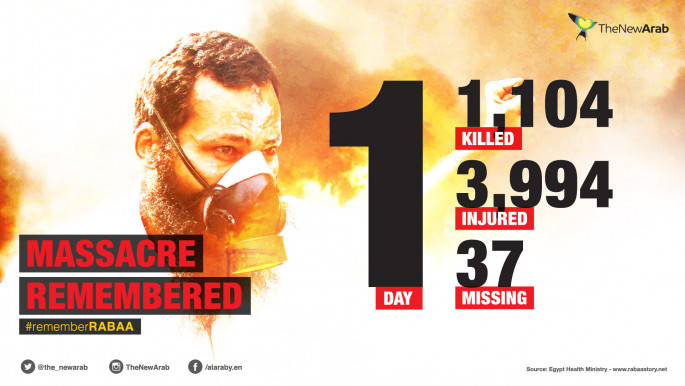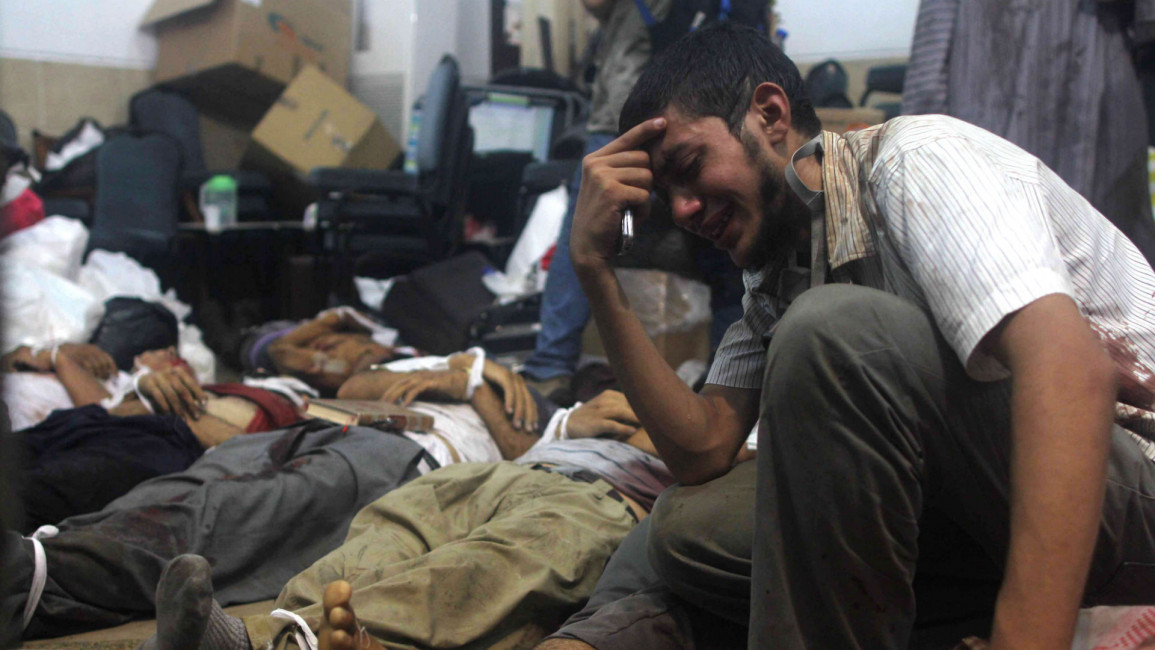
Why the martyrs of Rabaa massacre shall forever haunt the Sisi regime
At least not publicly.
We're talking about a regime that thinks nothing of abducting and imprisoning an Egyptian-American art teacher just as soon as she stepped off the plain at Cairo airport. What was the "crime" of Reem Mohamed Desouky? Criticising the regime of Abdel-Fattah al-Sisi on Facebook.
And this is how the regime treats US citizens. It hardly takes any great leap of imagination to understand what would happen to Egyptians who publicly draw attention to any of the regime's manifold crimes, let alone the single greatest massacre in the history of modern Egypt.
The extensive Human Rights Watch (HRW) report on the massacre carried the title "All According to Plan", highlighting the fact that, contrary to regime narratives that were unsurprisingly picked up by many western media outlets, this was not a case of "two sides" battling it out. This was not a case of the Egyptian government reacting to armed and violent protests after trying to peacefully disperse them.
The Egyptian security forces, on the orders of Sisi's coup regime, and still smarting from the victories of the January 25 revolutionaries over them at Tahrir, came ready and prepared to kill as many people as possible. By the time they were through, over 1000 people lay dead, including women and children, most of them having been caught by sniper fire, shot in the back while running away or hunted down like animals. Some were even burned alive or ran over by armoured vehicles in their makeshift tents.
Article continues below
Speaking to an Egyptian friend, his message regarding remembering Rabaa six-year-on is blunt. "Remembering [Rabaa] is pointless when it has no purpose," he tells me. "We can't speak it aloud or seek justice for it," is his conclusion, while he also cites the muted domestic and global reaction to the death of Egypt's first and only freely elected president Mohamed Morsi in custody as another signal of the futility of defiance in Egypt.
I'm in no position to argue with him, but I do have safety from the clutches of the regime and thus can publicly write and talk about the massacre without the threat of violence against me.
But I, like my friend, also ponder what exactly the point of remembering it is.
In this six long years since the massacre first took place, to say the world, which is perhaps now a little more cold and cruel than it already was at the time of the massacre, has "moved on" assumes incorrectly that it ever really cared at all about Rabaa.
Sure, there was some bluster from the Obama administration and the European Union before they began a twin process of politically and economically mitigating Sisi, while China and Russia openly supported both the coup and the subsequent terror unleashed by the regime.
In the region, the UAE and Saudi Arabia emerged as the two major financial and political backers of Sisi and his counterrevolution – covering the corpses with money in order to hasten the domestic functionality and normalisation of this monstrosity on the world stage.
The counter-revolutionary watershed
|
And it’s not like Rabaa was the end of something; indeed, it ought to be considered the beginning of what has been Sisi’s continuous counterrevolution. Beginning with Rabaa, Sisi began a crackdown on all dissent, which has seen Egypt transition from Mubarak’s authoritarianism into something akin to totalitarianism under Sisi.
Amnesty International described Egypt in 2018 as "an open air prison for critics", citing the mass arrest and imprisonment of Egyptians who even moderately or tacitly criticise the regime or aspects of life in Egypt.
The regime scours social media for thought criminals, turning moderate critical satire about Egypt's power shortages into "disseminating false information", or joining groups taking action against Egypt’s endemic sexual harassment problem into "membership of a terrorist organisation".
For these "crimes", journalists, activists and mere "tweeters" find themselves in military prisons, where they are detained without trial for months, facing torture and inhumane conditions, while those who do face trial find themselves in front of unjust military courts.
Along with this you have the hundreds or perhaps thousands of Egyptians who have been subject to enforced disappearances for perceived sleights against the regime. Then there’s the mass imprisonment of any and all opposition to Sisi, as well as what HRW call a "torture epidemic". That’s not to forget the sentencing to death of thousands of people, leading to a huge rise in the number of executions.
 |
US president Donald Trump not only continues monetarily aiding the regime, but he heaps praise on Sisi, tacitly supporting his human rights abuses |  |
Global complicity
How has the great world powers reacted to this?
US president Donald Trump not only continues monetarily aiding the regime, but he heaps praise on Sisi, tacitly supporting his human rights abuses, and even listens to his advice when it comes to the US potentially designating the outlawed Muslim Brotherhood, which provides much of the global opposition to Sisi among ex-patriots and Muslim communities.
Europe continues to be the largest supplier of weaponry to Sisi, despite knowing such weapons were used against innocent Egyptians, as in Rabaa, or continue to be used to carry out war crimes in the Sinai. Those who understand how Europe works, knows that it couldn't care less about the lives of mere Egyptians, but not even the abduction and brutal murder of the Italian student, and EU citizen, Giulio Regeni by the Egyptian security forces has stopped the EU of becoming Sisi’s firm ally.
In fact, in line with "Fortress Europe", the EU has come to rely on Sisi as a frontline enforcer of restricting refugees and asylum seekers from making it to Europe’s shores. Who could forget the nauseating sight of Angela Merkel in Cairo gushing about how Sisi's Egypt was a "role model for stability in the Middle East’ and in 'combatting terrorism and illegal immigration'?
When you consider all of this, you could be forgiven for thinking that remembering Rabaa is entirely pointless, but it’s as I write all of this that the reason for remembering Rabaa becomes apparent. I remember exactly what those who mere martyred on that day gave their lives for – it’s what those who continue to be oppressed and terrorised by the Sisi regime continue to risk their lives for.
The legacy of Rabaa's martyrs
That solitary year of democracy, brought about by the January 25 revolution, was precisely what those in Rabaa square were trying desperately to preserve.
One could pour through Morsi’s policies and present evidence of a president attempting, imperfectly, to transition the country towards democracy – until the moment he was removed by a military coup, he could’ve been removed in a free election. That’s exactly what Sisi intervened to avoid – the fundamental liberty of choice for Egyptians.
In short, it was to impede and destroy Egyptian self-determination knowing full well that this self-determination, in one form or the other would, go against the interests of the small praetorian kleptocracy that rules the country.
It dawns on me that thinking about Rabaa isn’t just an act of remembrance – it’s a glimpse into what the future of Egypt, free from tyrants and state terror, could have been and, however remotely, yet could be.
Sam Hamad is an independent Scottish-Egyptian activist and writer.
Join the conversation @The_NewArab
Opinions expressed in this article remain those of the author and do not necessarily represent those of The New Arab, its editorial board or staff.




